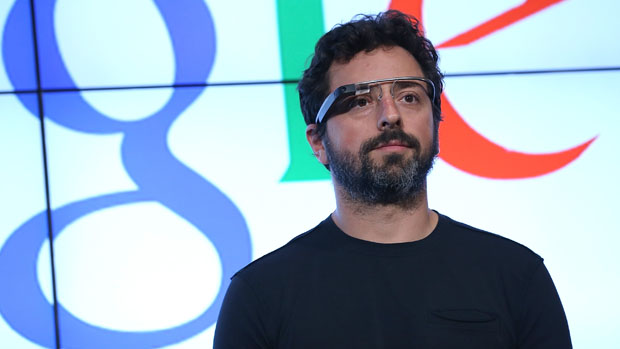Sergey Brin ridiculed for saying mobile phones 'emasculating'
But how can the 'geek' behind Google's Android OS tell people what is manly and what isn't?

A free daily email with the biggest news stories of the day – and the best features from TheWeek.com
You are now subscribed
Your newsletter sign-up was successful
GOOGLE founder Sergey Brin, whose company developed the Android operating system, has declared that smartphones are "emasculating" and claimed that his latest innovation, Google Glass, will help people interact better.
He said people's use of their mobile phones had become a nervous habit, like smoking, and meant they spent all their time looking down at the screen in their hand.
"You're actually socially isolating yourself with your phone," Brin told an audience at the Technology, Education and Design (TED) conference in Los Angeles, according to Wired. "I feel like it's kind of emasculating... You're standing there just rubbing this featureless piece of glass."
The Week
Escape your echo chamber. Get the facts behind the news, plus analysis from multiple perspectives.

Sign up for The Week's Free Newsletters
From our morning news briefing to a weekly Good News Newsletter, get the best of The Week delivered directly to your inbox.
From our morning news briefing to a weekly Good News Newsletter, get the best of The Week delivered directly to your inbox.
He said that Google Glass, a device that sits in front of the eye on a pair of spectacles, would mean that users were able to take in the world around them as information was relayed in their field of vision. He said testing the eyewear had "really opened my eyes to how much of my life I spent secluded away in email or social posts".
His comments prompted a strong reaction on technology websites.
PC Mag said that Brin's comments were "a dumb way to talk about technology" and noted that "the whole riff appeared to be an attempt to argue that the Google Glass spectacles he's thrown his weight behind over the past few years are supercharged engines of machismo".
John Gruber of tech blog Daring Fireball dismissed Brin's comments. "We're taking advice on cool from this guy? Seriously?".
A free daily email with the biggest news stories of the day – and the best features from TheWeek.com
San Francisco-based website Sfist.com agreed. Brin, a man who wears terminally-unfashionable Crocs shoes, was in no position to tell people that "your smartphone is totally making you look lame".
Plenty of Twitter users backed up that sentiment, pointing out that Brin was a renowned geek.
Bloomberg was equally confused by Brin's attack on mobiles. "Whatever their effect on the attributes usually associated with men, smartphones and other mobile devices are key to Google's future," it pointed out.
-
 Switzerland could vote to cap its population
Switzerland could vote to cap its populationUnder the Radar Swiss People’s Party proposes referendum on radical anti-immigration measure to limit residents to 10 million
-
 Political cartoons for February 15
Political cartoons for February 15Cartoons Sunday's political cartoons include political ventriloquism, Europe in the middle, and more
-
 The broken water companies failing England and Wales
The broken water companies failing England and WalesExplainer With rising bills, deteriorating river health and a lack of investment, regulators face an uphill battle to stabilise the industry
-
 Will AI kill the smartphone?
Will AI kill the smartphone?In The Spotlight OpenAI and Meta want to unseat the ‘Lennon and McCartney’ of the gadget era
-
 Has Google burst the Nvidia bubble?
Has Google burst the Nvidia bubble?Today’s Big Question The world’s most valuable company faces a challenge from Google, as companies eye up ‘more specialised’ and ‘less power-hungry’ alternatives
-
 How the online world relies on AWS cloud servers
How the online world relies on AWS cloud serversThe Explainer Chaos caused by Monday’s online outage shows that ‘when AWS sneezes, half the internet catches the flu’
-
 Is the UK government getting too close to Big Tech?
Is the UK government getting too close to Big Tech?Today’s Big Question US-UK tech pact, supported by Nvidia and OpenAI, is part of Silicon Valley drive to ‘lock in’ American AI with US allies
-
 Google: A monopoly past its prime?
Google: A monopoly past its prime?Feature Google’s antitrust case ends with a slap on the wrist as courts struggle to keep up with the tech industry’s rapid changes
-
 South Korea's divide over allowing Google Maps
South Korea's divide over allowing Google MapsTalking Points The country is one of few modern democracies where the app doesn't work
-
 Google avoids the worst in antitrust ruling
Google avoids the worst in antitrust rulingSpeed Read A federal judge rejected the government's request to break up Google
-
 Is AI killing the internet?
Is AI killing the internet?Talking Point AI-powered browsers and search engines are threatening the death of the open web